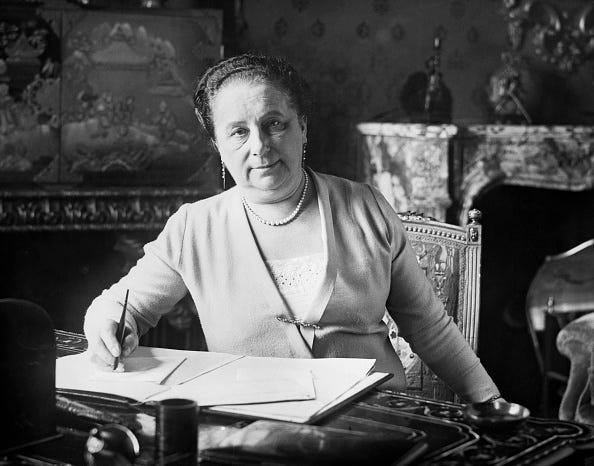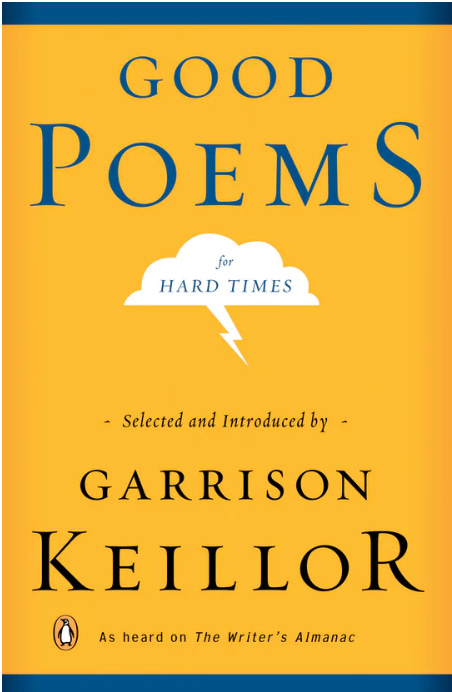TWA for Friday, September 23, 2016
“Clara: In the Post Office” by Linda Hasselstrom from Roadkill. © Spoon River Publishing, 1987.
ORIGINAL TEXT AND AUDIO - 2016
It's the birthday of poet Jaroslav Seifert, the only Czech writer ever to receive the Nobel Prize in literature, born in a suburb of Prague in 1901. Seifert came from a working-class family; for their wedding gifts, his mother, a Catholic, gave his father, a Social Democrat, a communist medallion. In return, he gave her a crucifix. "This shows how democratic the conditions were in our family," Seifert later wrote in his memoirs.
Seifert left school to become a journalist and a poet; he quickly excelled at both. He was a devoted Communist when the party first formed, after WWI, in the newly established Czechoslovakia, and he worked at a number of communist newspapers and magazines. As a poet, he was also a leading representative of the Poetist Movement, the belief that art should have no function or serve no purpose other than art itself, and worked on the staff of several literary journals. These two passions of his existed harmoniously for several years, until Seifert was expelled from the Communist Party for protesting its growing Bolshevik sympathies.
He continued as both a journalist and poet, until the Party gained control of the country in 1948 and forbade him from practicing journalism. Two years later, a collection of his poetry that expressed his disillusionment with Communism was censured for being a "misuse of poetry," a bitter irony, given his insistence that poetry shouldn't have an explicit use at all. Seifert continued to fall in and out of the Party's favor, alternately praised and censored, but the majority of his 30 volumes focused more on everyday life, nature, and love, than on politics.
Having survived Nazi occupation, the Stalinist regime and Communist oppression, Seifert continued writing — and collecting cactus plants — until his death in 1986, just three years before the Velvet Revolution brought democracy to his country.
He wrote, in a poem called "And Now, Goodby":
To all those million verses in the world I've added just a few.
They probably are no wiser than a cricket's chirrup.
I know. Forgive me. I'm coming to the end.
It's the birthday of Baroness Emmuska Orczy, born Baroness Emma Magdalena Rosália Mária Josefa Borbára Orczy at her family's estate in Hungary (1865). Part of the landed nobility, Orczy's family fled a peasant uprising when she was three, landing first in Budapest and then, after her composer and conductor father sent her to study music in both Brussels and Paris, finally settling in London. Orczy was 15 when she began to learn English, the language she would eventually make a small fortune writing in. But for now, she dropped music in favor of visual arts. It was a fortuitous switch, despite having been raised around friends of her fathers like Liszt and Wagner; she met her husband, Montague Barstow, in an art studio.
Barstow had little money to his name, so Orczy, who later described their marriage as one of "perfect friendship and communion of thought" in her autobiography, set to work translating and illustrating a book of Hungarian fairy tales with him. Inspired by the collaboration, she began to write more, publishing a few largely unappreciated novels and a number of short stories. She and her husband collaborated again, this time adapting one of her stories, about a swashbuckling Englishman, into a play, which Orczy then quickly adapted a final time, into a novel. Its protagonist, Sir Percy Blakeney, also known as the Scarlet Pimpernel, helped his aristocratic brethren escape during the French Revolution; Orczy's family's own flight from a working-class revolt helped inform her writing. The play version of "The Scarlet Pimpernel" was produced and ran in London's West End; in an early but unintentional example of brilliant cross-promotion, as it gradually drew larger and larger audiences, the sales for Orczy's novel of the same name grew too. Eventually it was made, and remade, for film and television.
Orczy went on to write many more adventure and mystery novels, many of which were sequels to The Scarlet Pimpernel; although commercially successful, none of them ever achieved the same popularity that the first in the series had. Orczy and her husband continued to work side by side for the rest of their lives — he painting, she writing — in a studio in their villa in Monte Carlo. Their only child, a son, had a brief writing career publishing with the last name Blakeney, his mother's famous character. It was, perhaps, a bit more dashing, or at least shorter, than Orczy-Barstow.
It's the birthday of Roman emperor Caesar Augustus, born Gaius Octavius Thurinus in Rome in the year 63 B.C. The great-nephew of Julius Caesar, Augustus was named as the childless statesman's heir upon his assassination. Despite Roman custom, Augustus dropped his middle and last name altogether to emphasize his new name, Caesar, probably hoping it would help legitimize his power grab. It did. The money he inherited helped, too. With the Senate in disarray, Augustus joined forces with two other leaders to form a three-headed military dictatorship. When that inevitably fell apart, Augustus remained in power. The Senate eventually decided to formalize his rule, changing the government's entire structure from a republican state to that of an empire. It was the beginning of an era that would last nearly 1,500 years, until the fall of Constantinople.
Augustus was widely respected during his reign, in part because of good works campaigns such as starting the first police and firefighting services and distributing funds to soldiers and veterans, in part because of his cultivated modesty, melting down statues of himself and restoring temples of Roman deities, and in part because of his creation of an imperial guard that acted as his personal intimidation team.
Augustus was not actually called Augustus until years into his reign; the term means "the revered one" and was given to him by the Senate. Roman emperors that followed him were also granted the term, and adopted the name "Caesar" too. Today, Caesar has come to be synonymous with emperor or ruler, but it began as simply a surname, probably from the Latin expression meaning "hairy." The word Augustus has found its way into modern-day language too; the sixth month of the Roman calendar was named in honor of the emperor — in English, we call it August.
It's the birthday of Mongol emperor Kublai Khan, born simply Kublai — the word Khan means ruler — somewhere in Mongolia in 1215. The grandson of the empire's founder, Genghis Khan, Kublai Khan inherited rule over a territory of North China as a young man. When his older brother, the emperor, died on a raid, Kublai Khan fought his little brother for succession and ultimately took control of most of the Empire, stretching across modern-day Mongolia and China.
Historically, Kublai Khan is remembered for founding the Yuan Dynasty, for adopting Chinese traditions to successfully garner popular support despite being a foreign conqueror, and for instituting paper money. But in Western culture, Kublai Khan is best known from two popular writings: Marco Polo's journal, and Samuel Coleridge's famous poem, "Kubla Khan."
Polo traveled to China with his father and uncle. It took them more than three years to travel from Venice to Kublai's Khan court; they stayed 17 years to make the trip home, another three years, worth their while. Polo was a teenager when they left. He quickly learned the language and served in Kublai Khan's administration. Although his account is regarded as questionable, it's the only personal depiction of Kublai Khan that exists. Polo praised him as a great leader but admitted to a few foibles: certain excesses, evidenced, for example, by the 22 sons he sired by his four wives ... in addition to the 25 sons he had with various other women. Presumably, he had daughters as well, but Polo didn't bother to mention them.
Polo also described Kublai Khan's summer palace, a place called Shang-tu, a word that became known as Xanadu in English. This "stately pleasure dome," as Coleridge called it, was the inspiration for one of the most famous poems in the English language, his phantasmagoric "Kubla Khan." The other inspiration, of course, was opium; Coleridge claimed to have woken from a drug-induced dream with the poem fully formed in his mind, but he only recorded a portion before he was interrupted and forgot the rest.
Because of Coleridge's poem, the word Xanadu is understood to mean a utopia, a place of perfect luxury and beauty, Kublai Khan's original Xanadu, although impressive, was likely a bit more rustic since it was able to be disassembled and moved at his command. As for the origins of the word itself, Shang-tu meant simply "Upper Capital," distinguishing it geographically from the main capital he founded to the south. Today, that permanent establishment is known as Beijing. All that remains of Shang-tu, or Xanadu, is a few grassy mounds on an empty plain.
Be well, do good work, and keep in touch.®
CLICK HERE to PURCHASE - GOOD POEMS FOR HARD TIMES





